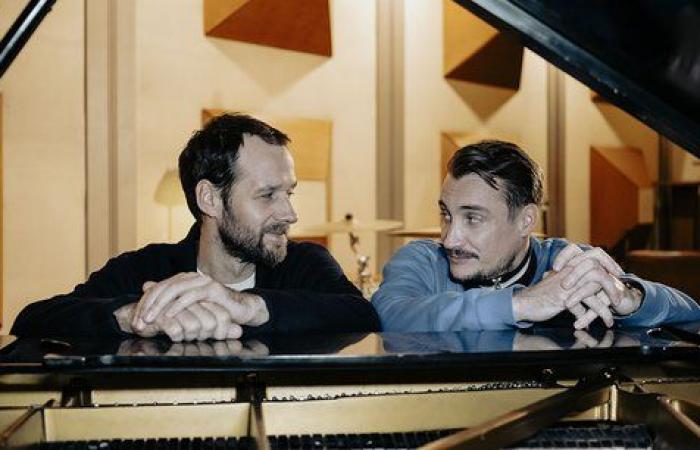One played the indescribable Wilfried, a simpleton rapper with poetic outbursts and machine-gun delivery in The Tuches. The other has scoured the roles of the classical repertoire on the stages of the Comédie-Française, rejoicing in embodying, among others, the emblematic Scapin under the direction of Denis Podalydès. In the cinema, everything could have opposed Pierre Lottin and Benjamin Lavernhe: the style as well as the roles. But that would reduce these two actors to their first professional loves. Today, the sensitivity, the force of proposal and the sensitivity of Benjamin Lavernhe, 40 years old, match perfectly with the instinct for play, the natural ease and finesse of Pierre Lottin, 35 years old.
The directors noticed this and offered them increasingly impactful roles: Pierre Lottin also plays the unloved son of the series. Please that a suspect in The Night of the 12th or the impulsive son of Josiane Balasko in When autumn comesby François Ozon; Benjamin Lavernhe knew how to be this unbearable young married man in The meaning of the party of the Toledano-Nakache duo, just like a fickle husband in Antoinette in the Cévenneswhere he embodied on screen a now controversial legend, Abbé Pierre.
Philippe Katerine: “I am anything but naive”
The two actors find themselves today in an exciting popular comedy where they play the title roles: two very different brothers who share a love of music. One plays a conductor; the other, a trombonist… A musical talent also shared by the two cinema prodigies, who immediately found a lot in common… Interview in German recording studios with two comedy fans, the 'one silent, the other less so.
LA TRIBUNE SUNDAY – You are both quite musical… Does this music studio make you want to jam?
PIERRE LOTTIN – Yes, it’s quite “feng shui”! It's true that I play the piano and that I compose, even… I always said to myself: “At worst, if cinema doesn’t work, I’ll become a concert performer!” » It's simple, right?
BENJAMIN LAVERNHE – There is a grand piano with incredible sound and touch… Me, if I had to do something other than cinema, I would be more musician than tax inspector, that's for sure! Because there is this “live performance” side, the dizziness of the stage and the audience: these are irreplaceable emotions.
Do you miss this spontaneity of the stage in the cinema?
P.L. On the contrary, I use it to play! In cinema, we can find the basis of music, that is to say its melody and its breaks, through the placement of the voice, the play with the body, and also with this sense of rhythm which installed when playing with partners… The game then becomes a kind of jam [improvisation musicale].
B.L. And we also feel the thrill of going live: even without an audience, there are the 30 people from the technical team who make the moment sacred. When the camera starts rolling, a suspended moment stops time, there is a magical vibration in the air, even if you can retake the shot twenty times. Between « action » et “cut”, the vertigo is therefore closer to that of a live performance. And then you never know which take is going to be kept, you have to give your all to each one.
P.L. What we do is branded: the stage which will be guarded will be seen by hundreds of thousands of people… This is the great specificity of cinema: we have a safety net which does not exist in the theater , but on the other hand, when it's done, it's done, and if it's bad, it's bad, everyone will see it and it will be set in stone.
Monica Bellucci: “I like to return to the shadows”
The film brings together two different social circles, in the vein of funny and social British comedies, without sinking into sentimentality…
B.L. It is this shock that creates the comedy. I value this genre a lot but I refuse a lot of it… By reading a screenplay, we see the traps into which a story could fall and how the author avoids them: what he makes his characters say, at what moment we hold back the emotion so that it is the spectator – and not the actor – who is in tears. It's modesty, and that's the intelligence of writing… Emmanuel [Courcol, le réalisateur] was vigilant not to fall into pathos, he avoided the pitfalls and the formatting of already rehashed and preconceived stories.
P.L. It's rare to read well-written comedies… Often the problem is the dialogue. In France, we leave too much room for very “prime” comedies. While behind this term, there is a whole world: for example, in P'tit Quinquin [minisérie de Bruno Dumont]there is both comedy and magnificent poetry. When we know that this UFO exists, we would like to discover other gems of this style! Anyway, there are two clichés: the first is that French cinema is boring, and the second is that French comedies are not funny. This is false, we simply don’t give “auteur” comedies enough of a chance; we say we want them, but we are afraid to finance them…
What makes you laugh in a scenario?
P.L. There are ways to make people laugh that are so good that they are universal. For example, the cartoon South Park…Why does it work so much when it's crazy and wacky?
B.L. Precisely because it is radical and “trashy”. But universal laughter is a very human laughter, it is not necessarily a very original humor: we laugh heartily because we recognize ourselves in a situation or on the contrary we burst out laughing because we are shocked, surprised.
Pierre Lottin and Benjamin Lavernhe in “En fanfare” (Credits: © Thibault Grabherr/Agat Films/France 2 Cinema)
P.L. For me, universal laughter is not banal at all. On the contrary, it is a sprawling and hyper-subtle humor: the fact of having the same laugh as someone who speaks another language and comes from a different social background than you, just from a look, that means that we understood in half a second everything that is serious and everything that is happening in the scene.
Like your characters, you have your own acting worlds. What brings you together despite your different backgrounds?
B.L. In fact, we have the same comedy references: the Farrelly brothers [Mary à tout prix, Dumb and Dumber] and actor Jim Carrey! In France, we dare less to go into burlesque, to take situation comedy far, we rarely “push” a scene to see how far we can go. But with Pierre, we love comedy, we have this greed, this common impatience, even if in fact we are very different: we “sniffed” each other and we found ourselves in an essential place: humor. Together, we saw the text as a musical score, we said to ourselves “go ahead, try to say it faster” or “there, try this intonation”, like with notes… It can't be explained, it was instinctive: we understood each other very quickly!
Jean Dujardin: “I imitated Zorro when I was 12”
P.L. Everything is said! Working on the body and the group spirit are also important to me… I wanted to be a soldier and, when I make a film about the army with physical preparation and I train, there is things that come back… But I don't regret having chosen cinema!
You have been doing this job for a long time and are becoming more and more successful. You have therefore managed not to let yourself be locked into your first roles, whether in The Tuches or at the Comédie-Française?
P.L. It's true that from the moment an actor knows how to play a role well we're going to lock him in… We have to create contrasts in the roles we choose, succeed in doing opposite things. Afterwards, thanks to “success”, we perhaps have more influence on the course of a scene: if we do our job well and we bring a different way of playing it, we manage to take it a long way. little else, and that's very interesting.
B.L. It is up to us to guide our choices by creating a little imagination, by not letting ourselves be confined. Afterwards, we naturally release something that we cannot fight against… But we are rather lucky that the directors imagine us in different roles. Sometimes we wonder if we are capable of it, the path to the role is dizzying… I love when the director takes us there: we have the impression of discovering a part of ourselves, we go down into the cave and we understand that we have a thousand lives within ourselves and that we can play big bastards even though we are nice in life! And then success keeps the dream alive: we are trusted more and more for more and more important roles… In fact, we got our foot in the door and that's good!
Find the theater or The Tuches (in 2025) still pleases you?
P.L. I'm happy, yes. I owe a lot to Tuche and this somewhat burlesque chronology, because I managed to use it well. I will never spit on The Tuches. Today, I have the impression that we categorize actors less, that we can use the media to break our “image”… And play different things, thanks to series too. Well, I notice that I'm starting to be a little too much in the same type of role, that of the slightly gruff guy… But I don't really care: you just have to move the fantasy that's in your head people by surprising them with roles in which they don't imagine you.
B.L. It's a luxury to be proud of your career and to love your entire filmography. But sometimes… you have to eat! Michel Galabru said that he had made 250 films, including 200 films, but he had to eat! In Anglo-Saxon countries, the transformation of actors is an integral part of this profession. In France, you are often taken for what you play, it's both normal and… a little worrying.
Musical-social comedy (3⭐/4)
Thibaut, a world-renowned conductor, must receive a bone marrow transplant and learns on this occasion that he was adopted and that he has a brother, Jimmy, a school canteen employee in the North and trombonist in a local brass band. This late meeting will change their lives. Between great music and fanfare, the clash of these two worlds is the ideal context to invent a delightful popular comedy which has the good idea of making people laugh and move people without falling into the marshmallow trap. Four years later A triumphwhich combined the prison environment with that of the theater, director Emmanuel Courcol signs a film which is joyfully inspired by the best British comedies with a social fiber, such as Billy Elliot or The Full Monty. A clever balance carried by a fine casting (special mention to Sarah Suco), an communicative team spirit and by the two leading roles, Pierre Lottin and Benjamin Lavernhe, as touching as they are hilarious in the clothes of these contrary brothers.
In fanfare, by Emmanuel Courcol. With Benjamin Lavernhe, Pierre Lottin, Sarah Suco, Jacques Bonnaffé. 1:43 a.m. Released Wednesday.







